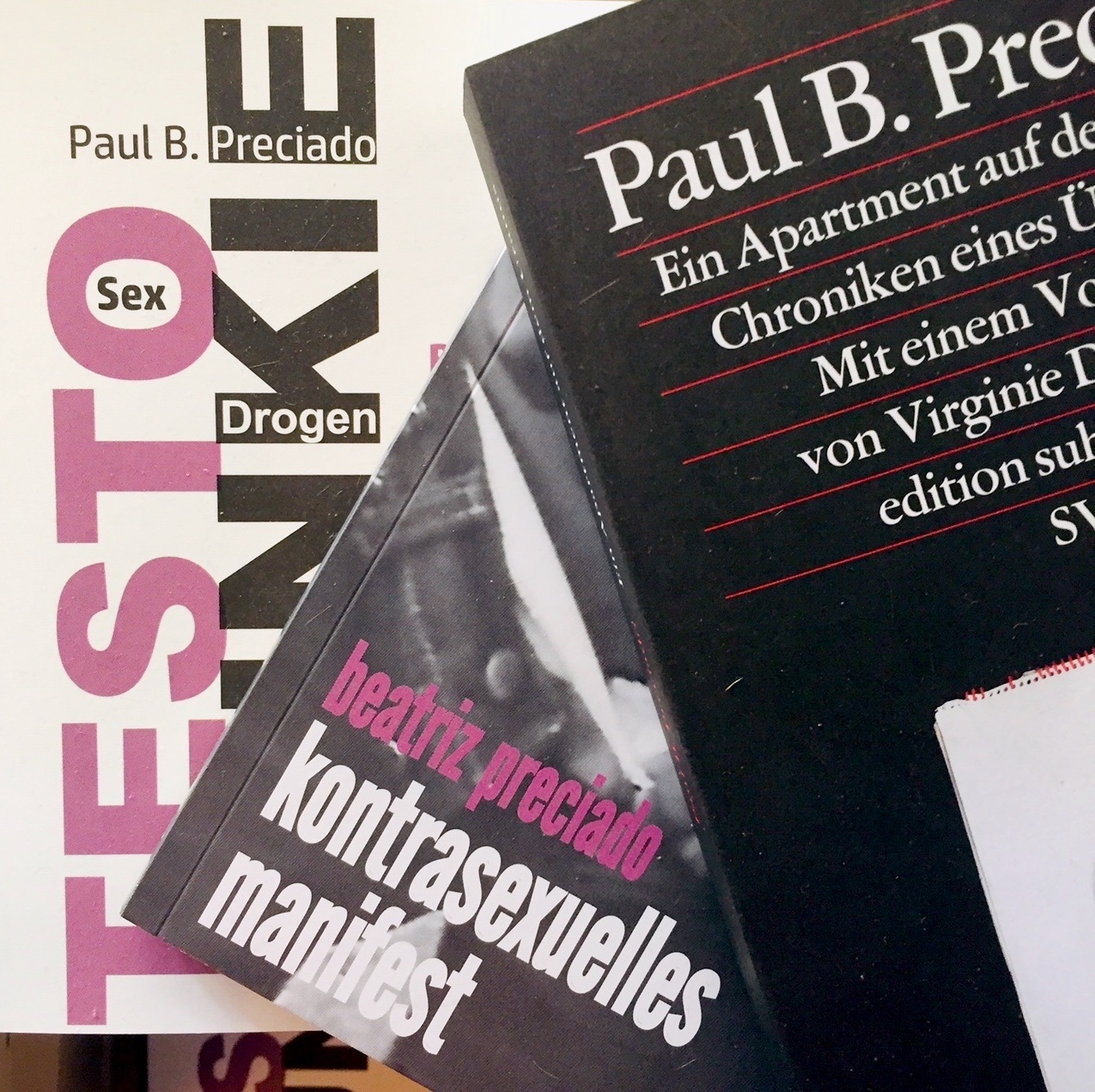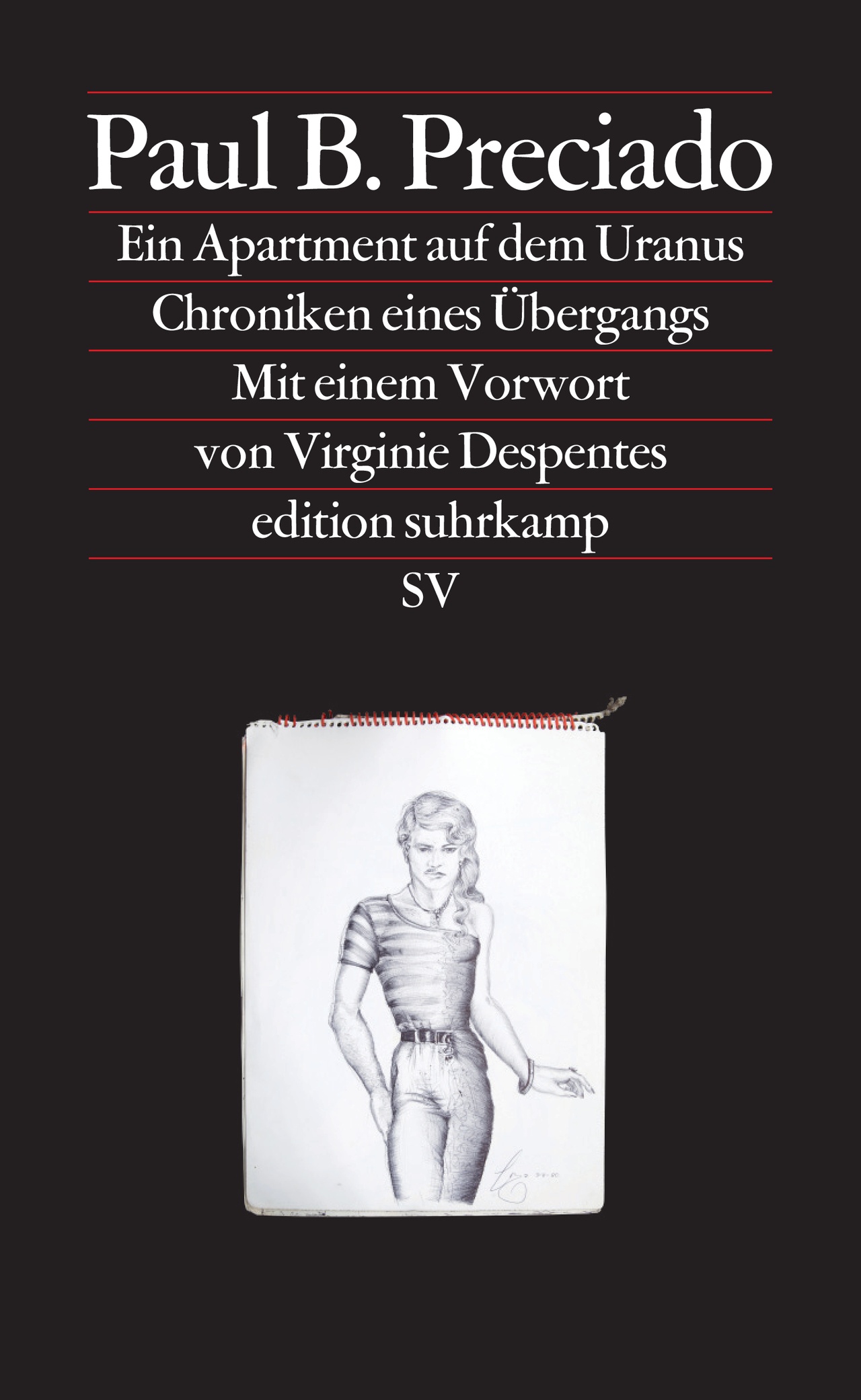Scaling Hotness to Life by Maxi Wallenhorst

The book that made Paul B. Preciado a theory rock star, Testo Junkie, is, as Daniel Loick described it in Texte zur Kunst no. 98, a life-changing book. It put forward no less than a history of sexuality on the pharmaceutic and pornographic level, interspersed with personal accounts of experimenting with testosterone in gel form. The casual megalomania of the former contextualized the sex scenes and drug prose of the latter and vice versa. Queer theory’s wet dream of a method, writing with the body, read as both surprisingly historical and pulpy here. With such autotheoretical drive, Testo Junkie rendered viscerally palpable how in a world where birth control and Pornhub constitutively inform gender norms, no matter whether you’re on a diet of almond milk or Testogel, no one is not subjected to the medical and aesthetic regimes of the “pharmacopornographic era.” This wasn’t as new as it was, condensed in such embodied form, hot. Testo Junkie was a hot book. For some (by which I mean, at least for me), hormones became hot then. A style that hinges on hotness in this way can be limiting – and in Testo Junkie, it often was. When it affects the desirability of something you might want, even need, it can of course also be life-changing.
In An Apartment on Uranus: Chronicles of the Crossing, a collection of columns Preciado wrote for the French newspaper Libération from 2013 to 2018, readers can follow him applying his brand of autotheory to a wider range of topics and forms: from quite realpolitik interventions in those struggles that on and off reach the threshold of “current debates,” like the legalization of sex work or reproductive rights for queer and trans people, to semi-literary riffs on high-theory concepts. Memories of growing up queer in Francoist Spain interchange with dispatches of navigating the 2010s art world as a travelling theorist. Magical realism dogs in Istanbul, the “performative force of a breakup” in Paris, sexy Molotov cocktails in Athens. Some of the texts are again just series of ornate imperatives, which often feel like thinly disguised “live, laugh, love” advice columns for people who think they have read too much Foucault to need them. That doesn’t mean they’re not also fun.
What connects all the cities, neologisms, and genres is the ‘passing’ that the book is documenting: Preciado writes about what it means to go through a life change that, in normative terms, would perhaps be called medical transition from female to male, while also maintaining great distance to every single one of these words. He makes clear that this is not a sentimental transition memoir and he’s not here to tell us “how to change your sex, or at what precise instant a transition is good or bad,” even if his prose is illuminating when he limits it to exactly that: in perhaps the most moving bits, also the most precise, Preciado reflects on his testosterone-induced voice change that makes phone calls a sadcom of misrecognition, or on changing his name – from choosing one, dismissing it, then choosing another one, to the Catalan magistrate who eventually signs a new birth certificate. For Preciado, this of course isn’t a linear quest for self-actualization. It’s one way of insisting on an intense life in the in-between. That is where he wants to rent the eponymous apartment. It came to him in a dream as located in space, on Uranus – where, tellingly, rent indexes and homophobic landlords don’t seem to play a role. Uranus is then also a reference to Karl Heinrich Ulrichs, a mid-19th-century German lawyer often credited as “one of the first” gay rights activists, who, in an attempt to give sexuality between men a more respectable name, campaigned around the term “Uranism,” derived from the mythological Greek god birthed by Gaia without insemination. For Ulrichs, certainly for Preciado, the astronomical and ancient charm provides a larger-than-life framework for their thinking about themselves.
“I am a dissident of the sex-gender system,” Preciado writes in the introduction; “I am the multiplicity of the cosmos trapped in a binary political and epistemological system, shouting in front of you.” Transness, as Preciado describes it, is always already so loud and amped up. Is there space here for those queer and trans people who don’t exactly feel cosmic forces culminating in themselves – who ‘just’ want to be chill and feel this-worldly? In fact, those who have a less expressive relationship to their marginalization (or a style of expressiveness that’s not legible within the tropes of transgression), are obviously not necessarily living less ‘dissident,’ let alone less multiple, lives. This was one way of reading the pharmacopornographic era Preciado had described in Testo Junkie, too: that the desire to feel normal (to get some rest, to talk about something else than one’s so-called identity, to stay alive) is not more normative than the desire to feel special when these feelings are so entangled with the libidinal economies of racial capitalism. In this book, however, and in a time where fairytales of disruption are valorizing start-ups, it almost seems antiquated how transgression – anchored in the intensity of experience more than aiming at what’s structural about it – is where Preciado locates so much political optimism. This is not a demand for representative inclusion into someone else’s journals. No one has to invite the shy types to the party where everyone has good style. However, when a project derives parts of its sense of political urgency from constantly summoning “trans bodies” in an unspecified zombie-plural, the question of who this actually refers to, and to what end, does come up. With his focus, Preciado is also simply missing out on thinking through forms of queer and trans world-making that in his eyes might not pass as emancipatory because they employ an aesthetics that’s less established as transgressive.

Scholars such as Grace Lavery, Andrea Long Chu, and Nora Collen Fulton have pointed out how much of the writing dealing with transness, especially in more recent queer theory that rebranded around the concept, is formed by a style that overemphasizes fragmentation, fucked-up-ness, fluidity. The complexity of lived experience is reduced and romanticized to a site of exemplary and inherent transgressiveness, or even transcendence. ‘Trans’ quickly becomes a reference to describe countless other things that are vaguely boundary-crossing, vaguely intense. The problem with this “analytic utility as a metaphor or interchangeable affix,” as Nora Collen Fulton puts it, “is that the transness of trans subjects themselves becomes curtailed to a kind of state of superfluousness (and/or superfluidity) in which questions of their being can then be ignored.”
Preciado, too, upscales his experience to grandiose method. He suggests no less than that it is “processes of transition that best allow us to understand the political shift with which we are confronted worldwide.” This might be a stylistic premise rather than an analytic one, but still, when transition becomes material condition, epistemic object, and go-to metaphor of writing all at the same time, it often just produces a feedback loop, hyphenated noise. Meaning: for Preciado, everyone is transitioning ‘a little bit.’ This might not even be wrong in many respects but as with every panta rhei-type slogan it takes a lot of specificity and/or cosmology to make it into a meaningful argument. Preciado tries hard in his comfort zone of theory camp: there, Catalonia is trans, and Documenta too. (The move of the opening of the 14th edition – in which Preciado was involved – apparently triggered a Kassel-to-Athens transition.) The analogy that becomes the driving force in many of the more explicitly political polemics, however, is one between “sex change and migration.” In this vein, Preciado describes himself as becoming a “gender migrant” and the mutation of his voice as “creolization.” And this is not even the worst of it.
The way that the private is, yes, political doesn’t take the form of cringey comparisons though. What may be an attempt at building solidarity beyond the “identity politics” that Preciado repeats he’s not into comes across as a highly racialized, and as such, intensified, metaphor to express the excitement of his white trans experience. How Preciado’s passport is questioned by airport security due to transition-related changes is violent, but to extrapolate from this a “very high social vulnerability” shared between “trans and migrant bodies” is misleading in scale. While of course both face violence from the very same institutions, to parallelize them in this way glosses over how these forms of oppression also intersect, overlap, and depend on each other. Preciado keeps name-checking “racialization” but he often doesn’t actually explore the ways in which it’s not secondary to the things central to his writing. The fact that non-white, and specifically Black, trans people experience the vast majority of anti-trans physical violence (whenever it’s not a stylistic device) is a starting point to think this through. When we say Black trans lives matter we mean that they matter to relatively niche autotheory, too, to the world of middlingly interesting Middle European art fair discourse, and to what style is. Refugee trans lives matter. Black trans lives matter.
Obviously, Preciado anticipates and evades such an earnest response by emphasizing playfulness, diaristic form, and provocation. When this is sometimes described as “performative,” “performative” seems to mean “oh, he doesn’t actually mean it like that.” However, it’s exactly these questions of tone that might have to do with a certain genre of critical theory, even or especially when it’s delivered in condensed auto- and column form. One can perhaps observe a similar politics of bad comparison in the wave of mostly embarrassing quarantine essays that many critical theorists, including Preciado himself but also many heterosexual and Italian authors, have published over the last months. As the predominant format of theory has shifted significantly from tiring monography to tiring panel discussion (often art-related), at least in its more literary forms, at least for the European context, the demand to react to the real world in real time has increased. Why is it so often so bad at that though? What seems less and less generative under these conditions is the method of applying preheated concepts to trending scenes of lived experience while in the same move mobilizing their sense of immediacy to make something that has merely the shape of an interesting point. Where theory stylistically relies on the hotness of hot takes, it doesn’t seem equipped to scale down its own moves in relation to the injustices of more life-sized forms of life and also death. Luckily – perish the thought! – the alternative is not a rollback to supposed formal sobriety. On the contrary, critically sticking to a scene with more commitment than the lip service of a 1:1 analogy might require even more radical poetic and polemical experimentation – which is not limited to but includes a different kind of hotness, sustained, as warmth.
Paul B. Preciado, An Apartment on Uranus. Chronicles of the Crossing, foreword by Virginie Despentes, translated by Charlotte Mandell (Los Angeles: Semiotext(e), 2020) / Ein Apartment auf dem Uranus Chroniken eines Übergangs (Berlin: Suhrkamp, 2020).
Maxi Wallenhorst is a writer based in Berlin.
image credit: 2. Suhrkamp Verlag, Berlin
